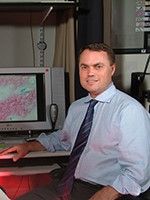Liquid biopsy project receives innovation award and funding
Six Weill Cornell scientists have been selected as winners of the Daedalus Fund for Innovation, a new medical college program that helps advance promising early-stage applied and translational research that has commercial potential.
The investigators, Drs. Peter Goldstein, Gang Lin, David Lyden, Stefano Rivella, Enrique Rodriguez-Boulan and Vladislav Sandler will each receive up to $100,000 one-year grants that fund studies demonstrating that their early-stage discoveries can be translated into effective treatments for patients. An independent advisory committee comprised of a Weill Cornell faculty member and experts from the biopharmaceutical and venture capital industries selected the projects from nearly 30 applications for the Daedalus Fund's first round of funding.
"The Daedalus Fund is helping us mobilize and innovate," said Larry Schlossman, managing director of BioPharma Alliances and Research Collaborations at Weill Cornell, who manages the Daedalus Fund. "That's incredibly exciting. I see so much rich opportunity in Weill Cornell's research enterprise, but some of the projects need a little help getting across the finish line or getting to the proverbial take-off point where they will be viewed favorably by industry as potential candidates for further development."
Established by Weill Cornell Dean Dr. Laurie H. Glimcher earlier this year, the Daedalus Fund is designed to help Weill Cornell investigators make their research more appealing to the biopharmaceutical industry. Investors require "proof of concept" — for instance, data derived from testing in animal models or the development of a new biomarker — as the standard by which they determine whether a project is ready for funding.
While grants from the National Institutes of Health or other agencies fund basic science research, they often don't provide enough money to cover these "proof of concept" studies. This funding gap is one of the greatest obstacles scientists face when trying to advance early-stage discoveries into next- generation treatments.
"We are extremely thankful that Weill Cornell came up with this program," said Dr. Rodriguez-Boulan, the Charles and Margaret Dyson Professor in Ophthalmology Research and a professor of cell and developmental biology, who up until now has received small, short-term grants from small foundations to investigate a new drug to treat incurable blinding diseases, such as Stargardt disease and age-related macular degeneration.
"With this grant from the Daedalus Fund, we will really be able to study the most important aspects in terms of developing drugs for human use. That means showing in animals that our drug can cure these diseases. Once you show that, you are one long step closer to a treatment in humans."
A LIQUID BIOPSY FOR CANCER
Invasive needle biopsies are the only way to tell whether a patient's cancer is responding to its prescribed treatment — and oftentimes the answer comes too late. By the time oncologists learn that the treatment isn't working, likely due to a mutation causing resistance, the cancer has likely already spread.
But that may soon change. David Lyden, the Stavros S. Niarchos Professor in Pediatric Cardiology and a professor of pediatrics and of cell and developmental biology, together with Dr. Hector Peinado Selgas, an assistant professor of molecular biology in pediatrics, have developed a blood test that isolates small, spherical tumor-secreted packages containing protein, RNA and DNA from patients' bloodstreams. Cancer cells release these vesicles, known as exosomes, which use the bloodstream to travel around the body and spread the seeds for metastasis.
Dr. Lyden believes his liquid biopsy can quickly determine how effective a cancer patient's treatment is by measuring the number and content of exosomes circulating in that patient's blood, ultimately leading to personalized treatment approaches. He also hypothesizes that the test can predict future cancer metastasis. The Daedalus Fund grant will enable Dr. Lyden to characterize and analyze the protein and DNA content of tumor exosomes. Ultimately, he will use that information to develop a platform that can identify and screen patients for biomarkers in melanoma, breast and prostate cancers.
"I was pleased that the reviewers funded a project that's considered ‘out of the box,'" Dr. Lyden said. "This is a whole new cancer field in which discoveries regarding the properties of cancer vesicles have been made by a few groups of investigators including work in our laboratory. This fund is helping us overcome a lot of obstacles and accelerate our projects so we can connect with drug companies to rapidly translate our discovery into a clinical application."
Read the rest of the story here.



